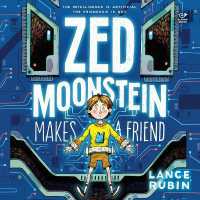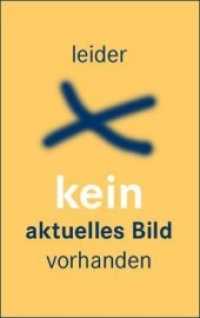Full Description
This book examines potential synergies between the fields of Terrorism Studies and Peace and Conflict Studies.
The volume presents theoretically- and empirically-informed contributions, which shed light on whether the two fields can inform each other on issues of mutual interest and importance. The book examines key themes including the conceptualisation(s) of peace and violence; the exceptionalisation of terrorist violence; the relationship between scholarship and political power; the dysfunctionality of the liberal peace and the opportunities offered by post-liberal peacebuilding frameworks; and the implications and challenges of cyber-terrorism and cyber-conflict. Furthermore, the book intends to be a launching pad for future debate on whether the recent 'critical' turn in terrorism studies can offer a pathway for peace studies to engage with the so far largely ignored question of power.
Consisting of not only key scholars but also practitioners and policy makers, the contributors present a number of case studies, including Colombia, Northern Ireland, the Basque Country, and Iraq, where they explore the relationships between terrorism and peace and conflict approaches. They critically analyse the statist approach inherent in both terrorism approaches and liberal peacebuilding frameworks; the role of the grassroots levels of society; the inefficiency of simplistic frameworks of understanding and implementation; and the chains of governance from international (and transnational) actors to national actors and finally from national to local actors.
This book will be of much interest to students of terrorism studies, peace and conflict studies, IR and security studies.
Contents
1. Introduction, Ioannis Tellidis Part I: Theories 2. Towards Critical Peace Research: Lessons from Critical Terrorism Studies, Richard Jackson 3. The Trouble with Empathizing with Terrorists: Critical Theory and Terrorism, David Martin Jones 4. Bringing Transitional Justice to Terrorism Research: Possibilities, Pitfalls and Critical voices, Judith Renner and Alexander Spencer 5. Processes of Disengagement from Political Violence: A Multi-level Relational Approach, Lorenzo Bosi and Donatella della Porta Part II: Case Studies 6. Conflict Resolution Practice in Conflicts Marked by Terrorist Violence: A Scholar-Practitioner Perspective, Sophie Haspeslagh and Veronique Dudouet 7. When Peace Implies Engaging the "Terrorist": Peacebuilding in Colombia through Transforming Political Violence and Terrorism, Annette Idler and Borja Paladini-Adell 8. From Freedom Fighters to Terrorists and Back, Gorka Elejabarrieta 9. Out beyond Occupy Fallujah and the Islamic State in Iraq and Sham, there is a Field..., Victoria Fontan 10. Peace Comes Dropping Slow: The Case of Northern Ireland, John Morrison 11. Terrorism, Violence and Conflict in the Digital Age, Lee Jarvis, Lela Nouri and Andrew Whiting 12. Conclusion: Terrorism Studies, Critical Terrorism Studies, and Peace Studies: A Vibrant Intersection or a Cul-de-Sac?, Harmonie Toros







